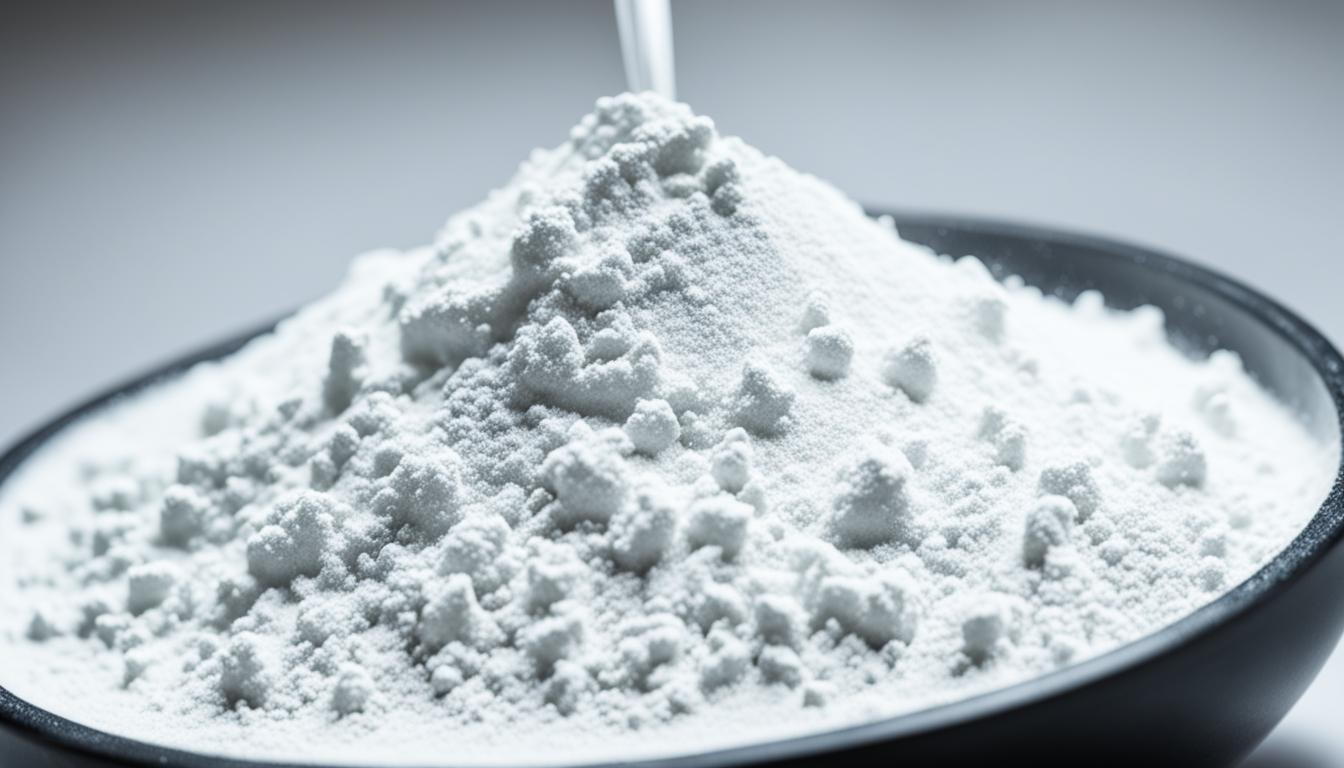
The use of cocaine is often associated with weight loss, as it can suppress appetite and increase metabolism. This powerful stimulant drug alters the brain’s reward pathways and interferes with hunger signals, resulting in a reduced desire for food and decreased food intake.
However, it’s important to understand that the weight loss caused by cocaine use is not a healthy or sustainable method for losing weight. The dangers of drug abuse and addiction far outweigh any potential benefits in terms of weight loss.
Cocaine is an addictive substance that can have serious repercussions on both physical and mental health. Prolonged use can lead to severe withdrawal symptoms, overdose, and even death. It is crucial to recognize the risks associated with cocaine and seek addiction treatment if needed.
Key Takeaways:
- Cocaine can suppress appetite and increase metabolism, resulting in weight loss.
- However, the weight loss caused by cocaine use is not healthy or sustainable.
- Cocaine is an addictive stimulant that can lead to withdrawal symptoms, overdose, and death.
- It is essential to recognize the dangers of drug abuse and seek professional addiction treatment if needed.
- Choosing healthy alternatives such as a balanced diet, regular exercise, and stress management is a safer and more sustainable approach to weight loss.
The Science Behind Cocaine and Appetite
Cocaine, a powerful stimulant, has a direct impact on the brain’s reward pathways and can significantly alter both appetite and metabolism. It interacts with specific receptors in the brain, causing a disruption in hunger signals, ultimately leading to suppressed appetite and reduced food intake. This can result in weight loss in the short term, as the body’s energy expenditure increases due to the stimulant properties of cocaine.
However, it’s crucial to understand that the long-term effects of cocaine on appetite and metabolism can be highly dangerous and detrimental to overall health. While initial weight loss may seem appealing, the consequences of sustained cocaine use can be severe.
The brain receptor interaction caused by cocaine ultimately blocks hunger signals, making it difficult for individuals to recognize or respond to their body’s natural signals of hunger. This unnatural suppression of appetite can lead to malnutrition and inadequate nutrient intake, putting individuals at risk of various health complications.
The alteration of metabolism caused by cocaine can also have detrimental effects. While it may initially increase the body’s energy expenditure, prolonged and excessive cocaine use can disrupt the body’s natural metabolic processes. This disruption can lead to imbalances and dysfunction within the body’s intricate systems, ultimately compromising overall health and well-being.
The Dangerous Illusion of Weight Loss with Cocaine
While cocaine use can lead to weight loss, it is not a safe or healthy method for achieving and maintaining a healthy body weight. Cocaine can cause malnutrition due to decreased food intake, as well as cardiovascular issues such as increased heart rate and blood pressure. Long-term use can also lead to addiction, which can have severe physical and psychological consequences.
Weight loss achieved through cocaine use is often the result of suppressed appetite and increased metabolism. However, this weight loss is not sustainable and can lead to detrimental health effects.
“Using cocaine to lose weight is like using a sledgehammer to crack a nut. It may seem effective in the short term, but it causes severe damage in the long run.”
Cocaine’s impact on the body extends beyond weight loss. The drug can cause malnutrition as individuals prioritize cocaine over essential nutrients, leading to a deficiency of vitamins, minerals, and other important substances. This can result in weakness, fatigue, and a compromised immune system.
Moreover, the cardiovascular effects of cocaine can be life-threatening. Increased heart rate and blood pressure can put immense strain on the heart and blood vessels, potentially leading to heart attacks, strokes, or other cardiovascular emergencies. The risk of these complications is further exacerbated by the frequent use and high doses associated with cocaine addiction.
It is important to understand that the temporary weight loss achieved through cocaine use is overshadowed by the dangers it poses to overall health and well-being. The illusion of weight loss with cocaine should not entice individuals to engage in drug abuse. Seeking professional help and addiction treatment is essential for those struggling with cocaine addiction to prevent further harm and promote long-term recovery.

Risks and complications associated with cocaine use for weight loss:
- Malnutrition
- Cardiovascular issues
- Increased heart rate
- High blood pressure
- Addiction
- Psychological consequences
Recognizing the dangers of using cocaine for weight loss is crucial in promoting a healthy approach to achieving and maintaining a desirable body weight. Prioritizing a balanced diet, regular physical activity, and seeking professional guidance can provide individuals with the tools necessary for sustainable and safe weight management.
Myths and Realities of Cocaine and Weight Loss
There are many misconceptions surrounding the idea that cocaine is a quick solution for weight loss. However, it’s essential to understand the physical and mental impacts associated with cocaine use. While some studies suggest appetite suppression and weight loss as possible effects, the reality is far more complex and contradictory.
Cocaine can have severe physical impacts on the body, including heart problems, constipation, sleep disturbances, and anxiety. These physical consequences can have long-lasting effects on an individual’s overall well-being and quality of life.
Mental impacts are also prevalent when it comes to cocaine use. It is a highly addictive substance that can lead to psychological issues and addiction. The effects of cocaine on the brain can be intense and can result in dependency that requires professional addiction treatment.
“Cocaine use not only affects weight but also has significant implications for overall health. It can lead to malnutrition, cardiovascular issues, muscle weakness, and compromised immune function.”
Research on the relationship between cocaine and weight loss is varied and often conflicting. While some studies suggest that cocaine suppresses appetite and leads to weight loss, others indicate that long-term cocaine use can actually result in weight gain.
To understand the true impact of cocaine use on weight and overall health, it’s crucial to consider the entire picture and acknowledge the potential dangers and risks associated with its consumption.

| Myth | Reality |
|---|---|
| Cocaine is a quick way to lose weight. | Cocaine use can have severe physical and mental impacts on the body, outweighing any potential weight loss benefits. |
| Cocaine suppresses appetite and leads to sustained weight loss. | While some studies suggest appetite suppression and short-term weight loss, long-term use can result in weight gain. |
| Cocaine use brings only physical impacts. | The mental impacts of cocaine use, including addiction and psychological issues, are significant and can have long-lasting effects. |
The Bigger Picture: Cocaine’s Impact on Health
Cocaine use not only affects weight but also has significant implications for overall health. The health risks associated with cocaine abuse are extensive, ranging from malnutrition and cardiovascular issues to muscle weakness and compromised immunity.
One major concern is the potential for malnutrition due to decreased food intake and poor nutrient absorption. Cocaine users often have a suppressed appetite, leading to inadequate nourishment. This can result in deficiencies in essential vitamins, minerals, and macronutrients, which are vital for maintaining a healthy body.
Furthermore, cocaine use can have profound effects on cardiovascular health. The drug can increase heart rate and blood pressure, putting strain on the heart and increasing the risk of cardiovascular issues such as heart disease, heart attack, and stroke. These cardiovascular complications can have long-lasting and potentially life-threatening consequences.
Another detrimental effect of cocaine use is muscle weakness. Prolonged cocaine abuse can lead to muscle wasting and decreased muscle strength. This can impair physical capabilities and overall mobility, leaving individuals more vulnerable to injuries and limitations in daily activities.
Additionally, cocaine abuse can compromise the immune system, making individuals more susceptible to infections and diseases. The drug weakens the body’s natural defense mechanisms, making it harder to fight off illnesses and recover from injuries.
Overall, the impact of cocaine on health is multifaceted and poses significant risks. From malnutrition and cardiovascular issues to muscle weakness and compromised immunity, cocaine abuse takes a toll on the body’s well-being. Understanding these health risks is crucial in promoting awareness and encouraging individuals to seek help and break free from the dangerous cycle of cocaine addiction.
Losing Weight the Healthy Way
When it comes to weight loss, it’s important to prioritize healthy and sustainable methods rather than resorting to dangerous shortcuts. Adopting a balanced diet, engaging in regular physical activity, getting adequate sleep, and managing stress levels are key components of a successful weight loss journey.
A balanced diet is crucial for providing your body with the essential nutrients it needs while promoting weight loss. Focus on incorporating whole, nutrient-dense foods such as fruits, vegetables, lean proteins, whole grains, and healthy fats into your meals. Avoid restrictive diets or fad trends that may lead to nutrient deficiencies or unsustainable eating habits.
Regular physical activity is another crucial aspect of healthy weight loss. Engaging in activities that raise your heart rate and burn calories, such as cardio exercises, strength training, or even daily walks, can help you shed pounds and build muscle. Aim for at least 150 minutes of moderate-intensity exercise or 75 minutes of vigorous-intensity exercise each week.
Getting adequate sleep is often overlooked but plays a significant role in weight management. Lack of sleep can disrupt hunger and appetite hormones, leading to increased food cravings and weight gain. Strive for 7-9 hours of quality sleep each night to support optimal physical and mental health.
Stress management is crucial when it comes to achieving and maintaining a healthy weight. Chronic stress can lead to emotional eating, increased cravings for unhealthy foods, and weight gain. Explore stress-reducing techniques such as mindfulness, meditation, yoga, or engaging in hobbies that you enjoy. Seeking support from therapists or counselors can also be beneficial in managing stress effectively.
Table: Tips for Healthy Weight Loss
| Component | Guidance |
|---|---|
| Balanced Diet | Focus on whole, nutrient-dense foods. Avoid restrictive diets. |
| Physical Activity | Engage in regular exercise, combining cardio and strength training. |
| Sleep | Aim for 7-9 hours of quality sleep each night. |
| Stress Management | Explore stress-reducing techniques such as mindfulness and meditation. |
By implementing these healthy strategies into your lifestyle, you can achieve sustainable weight loss and improve your overall well-being. Remember, prioritizing your health and making long-term changes is the key to success.
Conclusion
While cocaine may initially seem like a shortcut to weight loss, it poses significant dangers and risks to both physical and mental health. The use of cocaine as a means to lose weight is not only unsustainable but can lead to adverse effects on the body, including addiction, malnutrition, and cardiovascular issues. It is essential to understand that there are healthier and safer alternatives to achieve weight loss.
Instead of resorting to cocaine, individuals should focus on adopting a balanced diet that provides essential nutrients and practicing regular physical activity to promote overall well-being. Getting adequate sleep and managing stress levels are also crucial factors in maintaining a healthy weight. Embracing these healthy alternatives not only helps in weight management but also supports long-term health and wellness.
If you are struggling with cocaine addiction, seeking professional help from addiction treatment programs is crucial for recovery. These programs provide the necessary support, therapy, and resources to aid individuals in overcoming their addiction and improving their overall well-being. It is never too late to seek help and start on the path to a healthier and drug-free life.






